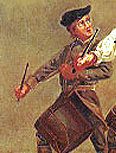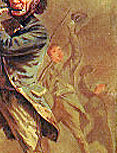The force involved came in the series of minor
wars orchestrated by the Prussian statesman Otto
von Bismarck, culminating in the Franco-Prussian
War of 1870-1871. Bismarck's wars were "minor" by
20th-century standards, although the
last one showed perhaps a tendency towards modern
total war, a tendency largely unrealized because
the war did not last all that long. When the dust
had settled, Germany had been united as a Bundesstaat
(federation), as opposed to a Staatenbund
(union of states or confederacy).
Unity at Prussian hands realized the kleindeutsch
("small German") program of excluding Austria from
the new Germany. This left no internal counterweight
to Prussia, the largest state, although – as I
noted in my last column – federal elements sometimes
restricted the centralizing intentions of the Prussian
dynasty, bureaucracy, and army. Many National Liberals
favored this outcome because they regarded Protestant
Prussia as inherently more progressive than Catholic
Austria.
Like Napoleon III in France and Disraeli in Britain,
Bismarck presided over the granting of universal
manhood suffrage. These conservative statesmen did
so on the assumption that their political allies
could make appeals to working class voters of a
kind that liberals could not, without violating
liberal principles. The result in Germany was a
multi-party system in the Reichstag (the
popular branch of government), which included the
National Liberals, the Catholic Center Party, Social
Democrats, and various agrarian and conservative
parties.
Bismarck thus had more than one choice of potential
allies with which to build a governing coalition.
In 1879, he famously went over to protective tariffs,
breaking his long-standing alliance with the National
Liberals. A cynic would say that all that the National
Liberals had gotten from their support of Bismarck
– aside from unification – was free trade and
the Rechtsstaat ("rule of law"), and in 1879
they had lost free trade.
THE
FREISINN: THE HARD CORE
There were a couple of liberal groupings to the
"Left" of the National Liberals, which had never
made acceptance of scraps from Bismarck's table
their political program. One of these was the Deutsche
Freisinnige Partei (Freisinn – roughly,
"free-minded" – for short). Their most consistent
and able parliamentary leader and spokesman was
undoubtedly Eugen Richter (1838-1906).
Richter was born in Düsseldorf. He studied political
science in Bonn and, later, Heidelberg, where he
also studied public finance. From a liberal family,
Richter became engrossed with politics and by 1884
he headed the Freisinn.
The party was "Left-liberal" at a time when that
meant adherence to the genuine liberal ideas of
free trade, limited, constitutional government,
free markets, and peace. Caught between the German
Right, with its conservative welfare state pioneered
by Bismarck, and the Social Democratic Left with
its Marxism, Richter was forced to conduct a "two-front"
struggle for the program of laissez faire liberalism.
This he continued to do, almost down to his death,
despite continual political defeat and defection
from the ranks. Historian
Ralph Raico sees Richter as the last real liberal
of any importance sitting in any European parliament
at the end of the 19th century.
RICHTER
ON DOMESTIC POLICY
Richter has not done well at the hands of historians,
German or otherwise. For them, he is the paradigmatic
"petty bourgeois penny-pincher" who served the narrow
interests of the middle classes – freedom, prosperity,
peace: those negligible things – when he could
have had a great social or national vision, indeed
a great national-social vision. Richter gets little
notice, and historians misunderstand him with almost
premeditated hostility.
One reason is his line on German domestic policy.
Richter was a thoroughgoing opponent of state intervention
– welfarism, subsidies to business, and socialism
– whether brought forward by the Right or the Left.
Bismarck despised Richter's constant drumfire of
criticism, but had to concede that Richter was a
master of budgetary details and "the best speaker
that we had" in the Reichstag.
Richter's constant defense of civil liberties,
his calls for limits on public spending, and the
rest did not sit well with the Iron Chancellor.
Richter sought to promote the free growth of German
civil society and to prevent its absorption by the
modern and modernizing state. Thus, he did not support
Bismarck's famous assault on German Catholicism,
the Kulturkampf, and he opposed those political
parties which were beginning to dabble in anti-Semitism
as a means of gaining support.
As for Bismarck's integrated program of workers'
pensions, tariffs, and subsidies to industry, Richter
saw therein the unleashing of a thousand Sonderinteressen
("special interests"), which would raid the public
treasury and distort the workings of the German
economy. This benefited no one, other than the special
interests and certain political actors. Even the
apparent gains to workers were being paid for –
by the workers themselves.
RICHTER
ON FOREIGN POLICY
If
Bismarck and the Imperial authorities disliked Richter's
running battle against their domestic policies,
they must have really hated his critique of their
military and foreign policies. This field was, in
their minds, the exclusive prerogative of the Kaiser,
his ministers, and his armed forces. They did not
like having to put up with complaints from a representative
of the mere middle-class taxpayers.
Ralph Raico notes that Richter was "famous for
his fight against militarism and Weltpolitik."
Weltpolitik ("world policy"), which grew
worse after the young Kaiser Wilhelm II dismissed
Bismarck as Chancellor, involved a dangerous tendency
to self-assertion by the German Empire. In the circumstances
of the late 19th century this could only
contribute to a destabilization of European international
relations. Richter quipped that Weltpolitik
meant that "one wishes to be everywhere, where something
has gone wrong."
Richter consistently resisted all military spending
and all war which was not directly linked to genuine
self-defense of the German nation. Private interests
might wish to found colonies overseas, as in Africa,
but the German state should not play a role in such
efforts. Since this – private colonization – was
unlikely to happen, Richter in effect opposed German
colonialism. He remarked that such efforts simply
transferred wealth from the relatively propertyless
at home to more prosperous persons who wished to
acquire and protect overseas investments at public
expense.
The expansion of the German fleet was another pet
project of the authorities, and business interests
that wanted shipbuilding contracts. Richter rightly
pointed out that such expansion could have no rational
connection with German defense. Instead, the naval
buildup – big enough to appear threatening, too
small to make any military difference in a major
war – could only serve to worsen Germany's relations
with England. This would make war more likely. Admiral
Tirpitz, spearhead of the naval expansionists, considered
Richter "my most unsparing opponent."
Richter's sole deviation from his anti-imperialist
critique lay in his support for the German sphere
of influence in China. This inconsistency may have
resulted from his lack of an overall theory of
imperialism. Still, as Raico observes, it is interesting
that Richter's last vote in the Reichstag in 1904
was in opposition to expenditures for a protectorate
in Togo. For Richter, it was not the glory of the
monarch but the welfare of the people – understood
as resting on free markets and private property
– that was the true goal of all policy.
THE SANITY
OF PENNY-PINCHING
In
the light of what took place after Richter's death
– in the name of public greatness and the like
– it is remarkable that the man receives so little
credit for his critique of militarism and adventurist
foreign policy. Socialist historians disdain him
as a frontman for the bourgeoisie. That middle-class
elements might have had as much natural interest
in peace as workers is lost on them. Non-socialist
historians fault Richter for his lack of national
vision.
Had there been more Eugen Richters in all the parliaments
of Europe prior to 1914, the 20th century
might have been a good deal less dramatic. Instead,
the Jingoists and the Social Reformers got together,
as someone said of the United States in the age
of Teddy Roosevelt, and got together in every major
nation. Of the case at which we having been looking,
F. A. Hayek put it this way: "the union of the anticapitalist
forces of the Right and of the Left, the fusion
of radical and conservative socialism,... drove
out of Germany everything that was liberal."
Sources:
Ralph Raico, "Eugen
Richter and Late German Manchester Liberalism: A
Reevaluation," Review of Austrian Economics,
4 (1990), pp. 3-25, and Die Partei der Freiheit
(Stuttgart: Lucius & Lucius, 1999), chapter
on Richter, pp. 87-151. F.A. Hayek, The
Road to Serfdom (Chicago: University of
Chicago Press, 1944), p. 168.









